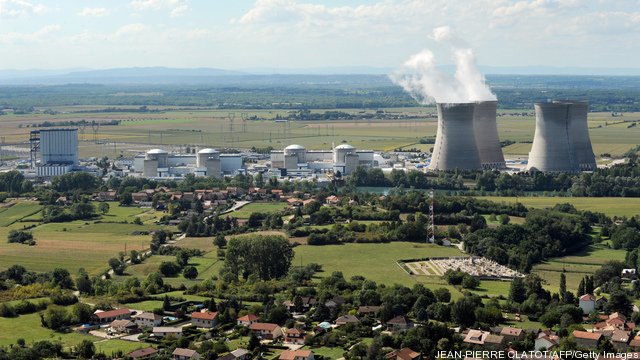 France’s Socialist Party (PS) newly-elected President Francois Hollande (R) reacts on stage, flanked by (from L, 1st row) socialist Arnaud Montebourg, socialist President of the Poitou-Charentes region Segolene Royal, Hollande’s campaign political advisor Jean-Michel Baylet, Hollande’s campaign manager Pierre Moscovici, Hollande’s campaign political advisor Harlem Desir, Hollande’s campaign chief of staff Faouzi Lamdaoui, Hollande’s campaign political advisor Martine Aubry and Hollande’s companion Valerie Trierweiler, at the Place de la Bastille in Paris on May 7, 2012, after the announcement of the first official results of the French presidential second round. Hollande had won with 51.62 percent of the vote to 48.38 percent for Sarkozy on May 6, 2012, becoming France’s first Socialist president since Francois Mitterrand left office in 1995. AFP PHOTO / FRANCK FIFE
France’s Socialist Party (PS) newly-elected President Francois Hollande (R) reacts on stage, flanked by (from L, 1st row) socialist Arnaud Montebourg, socialist President of the Poitou-Charentes region Segolene Royal, Hollande’s campaign political advisor Jean-Michel Baylet, Hollande’s campaign manager Pierre Moscovici, Hollande’s campaign political advisor Harlem Desir, Hollande’s campaign chief of staff Faouzi Lamdaoui, Hollande’s campaign political advisor Martine Aubry and Hollande’s companion Valerie Trierweiler, at the Place de la Bastille in Paris on May 7, 2012, after the announcement of the first official results of the French presidential second round. Hollande had won with 51.62 percent of the vote to 48.38 percent for Sarkozy on May 6, 2012, becoming France’s first Socialist president since Francois Mitterrand left office in 1995. AFP PHOTO / FRANCK FIFE
The last 48 hours shifted the political landscape across Europe, and with it, the debate over energy policy. Keep reading →




 Chairman of the Nuclear Regulatory Commission (NRC) Gregory Jaczko listens to his introduction before he delivers remarks at the Regulatory Information Conference on March 13, 2012 in Rockville, Maryland.The long-expected federal decision giving SCANA a license to build two new
Chairman of the Nuclear Regulatory Commission (NRC) Gregory Jaczko listens to his introduction before he delivers remarks at the Regulatory Information Conference on March 13, 2012 in Rockville, Maryland.The long-expected federal decision giving SCANA a license to build two new 


